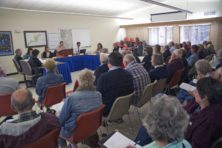Judge Refuses to Halt Work on Egg Harbor Library, Holds Village to $1 Million Max Spending
- Share
- Tweet
- Pin
- Share

Door County Judge D. Todd Ehlers issued an injunction against the Village of Egg Harbor that prevents spending any more than $1 million of village funds on construction for the new library/community center. Work on the $5 million building began last month.
“I need to put the brakes on this thing,” Ehlers said at the March 9 hearing of a complaint filed by a group of five full- and part-time village residents calling themselves Village of Egg Harbor Planned Growth Alliance LLC.
The group alleges the village violated one of its own ordinances in January when it approved a contract with the Boldt Co. for construction of the library and resolving in November 2016 to spend up to $2 million of village funds on the project. The group maintains an ordinance that was passed by referendum in 2008 prevents the village from spending $1 million or more on a capital project without a binding referendum.
“I’m not going to halt construction,” Ehlers said, which is one of the judgments sought by the plaintiffs.
“As long as the village is not expending more than $1 million,” Ehlers said. “They’ve got the right to spend up to $1 million, but they stop at $1 million. That’s all I’m doing today. That’s all the further I’m going.”
The group is represented by Sturgeon Bay Attorney Randy Nesbitt, and the village is represented by Appleton attorneys Ashley Lehocky and Richard Carlson.
Nesbitt argued that with the village on record in the form of village meeting minutes resolving to spend no more than $2 million on this project, and another approving a project exceeding $1 million without a referendum and construction already underway, the village “is clearly in violation of its own ordinance.”
He said the plaintiffs want the village to follow directives of the ordinance, halt construction without holding a referendum, and that the village not be allowed to amend or repeal the ordinance until the final order of the court is entered.
Nesbitt also produced a deed for the land where the former Lighthouse Inn once sat and where the library will be built, and contended the village had paid $500,000 for the deed, thereby making the village’s contribution to the project $2.5 million.
Judge Ehlers asked Nesbitt what authority he had to ignore Wisconsin statute 9.20(8), which, as he read it, allowed the board to amend or repeal a direct legislation (referendum) ordinance after two years.
Nesbitt argued that section of the statute requires the referendum going back to the electorate for amendment or repeal, but Ehlers disagreed, saying he continued to have a problem understanding where his authority would be in preventing a duly elected board from acting on the referendum.
“I think the court has hit the nail right on the head,” Attorney Lehocky said about section 9.20(8), adding that it would be a violation of separation of powers. She then went on to explain that the village never took the proper steps to adopt the 2008 resolution.
“You’re telling me the village didn’t do anything after this direct legislation was passed?” Ehlers asked.
Lehocky referred to section 5 of the same direct legislation ordinance, which requires the municipal clerk to post a labyrinthine series of notices regarding the ordinance.
“That never occurred, and because of that, the ordinance was never adopted,” Lehocky said.
“I’ll tell you right now, Ms. Lehocky, you’re not going to win the day today on that issue,” Ehlers said. “We’re going to have a trial, we’re going to have a hearing and then I’m going to get to the bottom of this. This isn’t currying any favor with me quite frankly.”
To clarify the village argument that the building project falls within the confines of the 2008 referendum, Lehocky had village administrator Ryan Heise take the stand.
Lehocky had Heise reveal that the $500,000 for the land came from a donation from the Kress family to the village, and she submitted a letter into evidence from the town clerk, thanking the Kress family for the donation to purchase the property.
Much of the rest of her questioning revolved on what seems will be an important part of the defense, the wording of the referendum, particularly the words “physical construction.”
Heise testified that the cost of the “physical construction” of the building is $5,034,229, and donations to date are $4,306,000, which leaves the village contribution for “physical construction” at $728,229, well below the resolution cap. The rest of the village expenditures would be “soft costs” such as design, furniture, moving costs and fees.
The next court date was set for 8:30 am on May 2. The Egg Harbor Village Board meets at noon on March 13.


